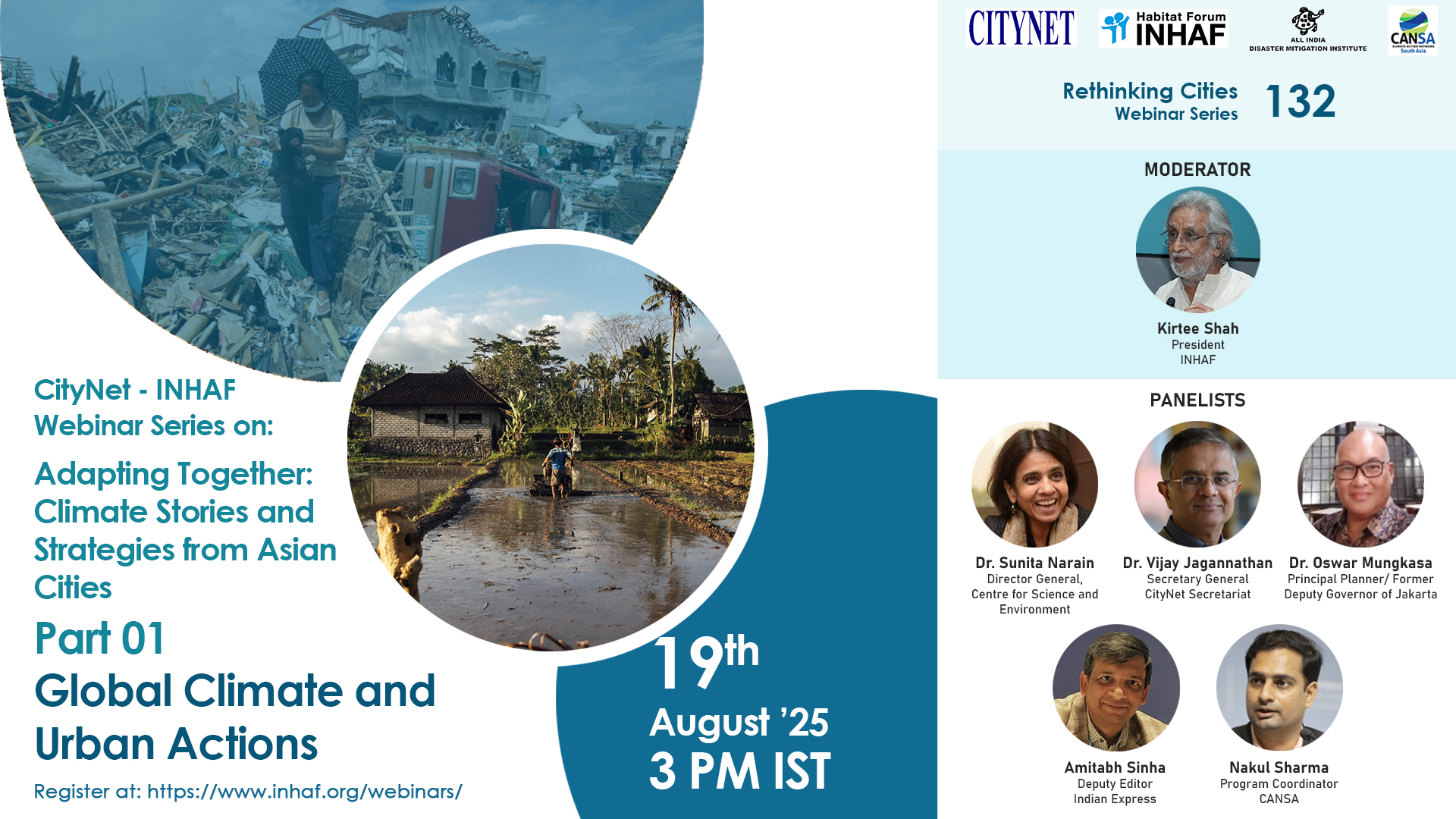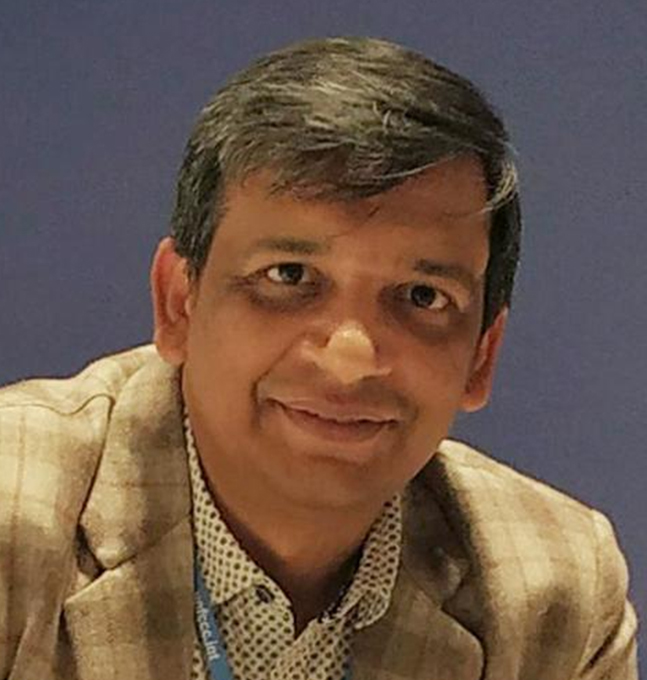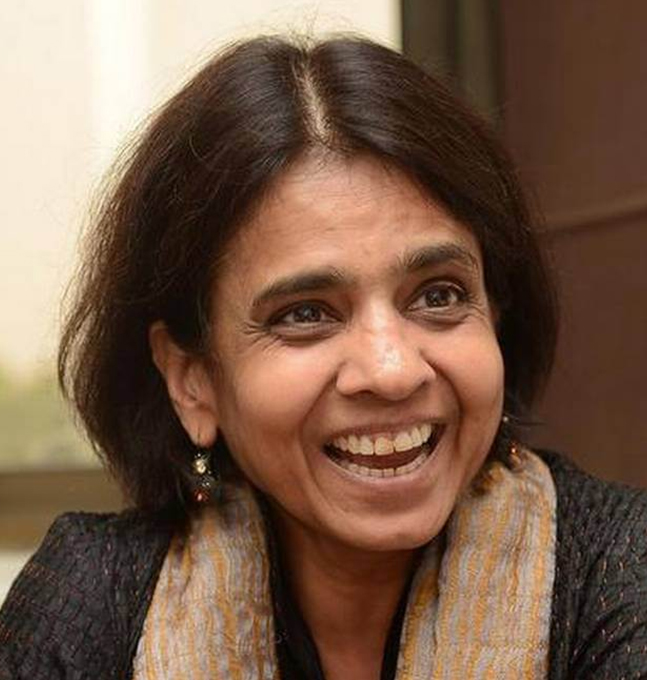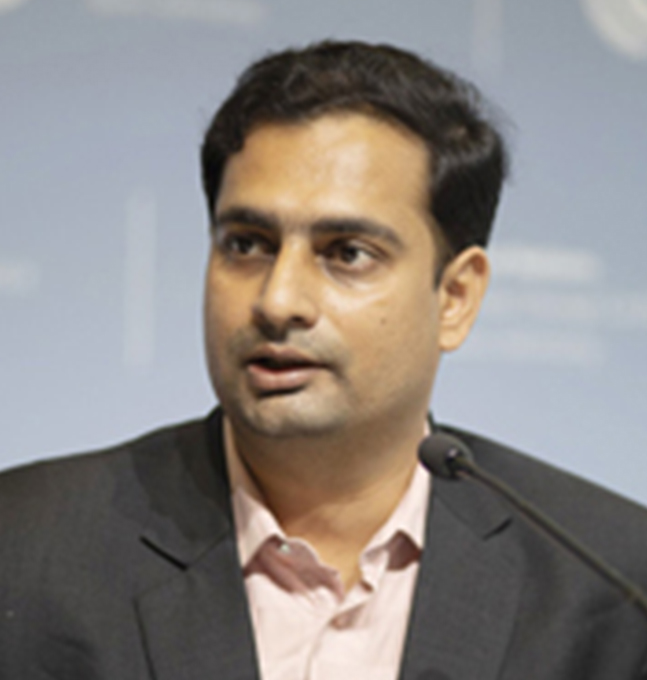
Speakers
-
 Amitabh SinhaDeputy Editor, Indian Express
Amitabh SinhaDeputy Editor, Indian ExpressAmitabh Sinha is Deputy Editor at The Indian Express. He has been a journalist for 23 years, and has previously worked with Press Trust of India, Reuters and BBC. At The Indian Express, where he has spent more than 15 years, Amitabh writes mainly on climate change and science, two very vast fields that cover a range of topics. Amitabh is a Chemistry graduate and has a Masters in Public Policy besides a post-graduate diploma in journalism.
-
 Dr. Oswar MungkasaPrincipal Planner / Former Deputy Governor of Jakarta
Dr. Oswar MungkasaPrincipal Planner / Former Deputy Governor of JakartaOswar Muadzin Mungkasa, Principal Planner and former Deputy Governor of Jakarta for Spatial Planning and Environment (November 2015 – October 2019), is an esteemed urban planner and resilience strategist. He holds a Master’s degree in Urban and Regional Planning from the University of Pittsburgh and a Ph.D. in Public Economics from the University of Indonesia.
With a career initiated in central government roles—with leadership positions such as Director of Planning & Budgeting at the Ministry of Housing (2010–2013) and Director of Spatial Planning & Land at Bappenas (2013–2015)—he brought significant expertise to Jakarta’s urban policy domain. Appointed as Jakarta’s Chief Resilience Officer, he steered the formulation of the city’s resilience strategy and spearheaded collaborations across stakeholders to address critical issues such as land subsidence, floods, waste, and infrastructure vulnerabilities.
Notably, Mungkasa implemented sustainable initiatives including river naturalisation and vertical drainage systems to recharge groundwater and counteract Jakarta’s sinking—programs expected to deliver long-term impact over a decade. He also chaired monitoring teams like the Budget Absorption Monitoring Team to improve fiscal efficiency and accountability in urban governance. His leadership exemplifies a data-driven, cross-sectoral approach to building a livable, resilient megacity.
-
 Dr. Sunita NarainDirector General, Centre for Science and Environment (CSE)
Dr. Sunita NarainDirector General, Centre for Science and Environment (CSE)Sunita Narain has been with the Centre for Science and Environment (CSE) since 1982 and currently serves as its Director General, Treasurer of the Society for Environmental Communications, and Editor of Down To Earth. A leading voice for environmental justice, she has over four decades of work combining rigorous research, advocacy, and pro-poor perspectives to shape public policy in India and globally.
She has played a pivotal role in campaigns on air pollution control, community water management, urban sewage reform, pesticide regulation, and climate change negotiations, always emphasising equity, democracy, and sustainable development for the Global South. Her leadership influenced transformative policies such as Delhi’s shift to cleaner fuels, promotion of rainwater harvesting, and advocacy for affordable sanitation systems.
Narain’s contributions have been recognised with numerous awards, including the Padma Shri, Stockholm Water Prize, Prince Albert II of Monaco Foundation Award, and Edinburgh Medal. She has been named among Time magazine’s 100 most influential people and Foreign Policy/Prospect’s top public intellectuals. She has served on the Prime Minister’s Council for Climate Change, chaired the Tiger Task Force, and been a member of the National Ganga River Basin Authority.
Her work has advanced the “environmentalism of the poor,” argued for leapfrogging to pollution-free growth, and connected issues of biodiversity, nutrition, and livelihood. Through CSE, she continues to strengthen independent environmental research and advocacy, believing that sound science and participatory governance are the keys to a sustainable and equitable future.
-
 Dr. Vijay JagannathanSecretary General, CityNet Secretariat
Dr. Vijay JagannathanSecretary General, CityNet SecretariatDr. Vijay Jagannathan comes from the World Bank where he was Sector Manager for infrastructure in the East Asia and Pacific region. He was responsible for an annual lending program of about $5 billion in the urban, water, transport and energy sectors. Dr. Jagannathan has been also associated with the APEC-led green growth and green finance initiatives. He has worked in the infrastructure, environment and urban development sectors in his twenty four years in the Bank. Prior to that he spent 10 years in Indian Administrative Service.
He is an economist by training, with a PhD from Boston University. His dissertation on the informal markets for the poor was published by Oxford University Press in 1987 and recognized as one of the “Outstanding Academic Books of the Year” by the American Library Association. He has published extensively on water, urban development, agricultural development and environmental issues.
Dr. Jagannathan currently serves as a Senior Fellow at the World Resources Institute, and has been a consultant with the Green Climate Fund. He is a member of the United Nations Sustainable Development Group for Urban Issues, and is working closely with the New Climate Economy initiative. He is advising the China Council for International Cooperation on Climate and Development (CCICED) in its Special Policy Study on “Good City Models under the Concept of Ecological Civilization.” In 2023, Dr. Jagannathan was appointed to the Advisory Board on Zero Waste by the Secretary General of the UN. He was elected as Secretary General of CityNet at the 2013 CityNet Seoul Congress.
-
 Nakul SharmaProgram Coordinator, Urbanization and Energy Transition, CANSA
Nakul SharmaProgram Coordinator, Urbanization and Energy Transition, CANSANakul Sharma is a clean energy enthusiast, working with CANSA on various programs related to capacity building, policy analysis, and advocacy. He provides evidence-based analyses to promote fair, inclusive, and just energy transition in South Asia. His areas of expertise, combined with keen interest, are the promotion of renewable energy and clean energy policy, access to transition and infrastructure finance, and ensuring energy justice in the Global South.
Local Time
- Timezone: America/New_York
- Date: Aug 19 2025
- Time: 5:30 am
Adapting Together: Climate Stories and Strategies from Asian Cities (Part I) – Global Climate and Urban Actions
About the Webinar Series – Adapting Together: Climate Stories and Strategies from Asian Cities
Habitat Forum (INHAF), a civil society organization and CityNet member from India in collaboration with CityNet, AIDMI, CANSA, is launching a new initiative: a 5-part webinar series on Cities and Climate Change. The series is intended for all those engaged in the field of Urban Development, with the goal of responding to the unique and growing challenges posed by climate change. These challenges call for a rethinking of existing urban systems, practices, and governance mechanisms.
Cities all over the world are being battered by climate impacts such as extreme rainfall and consequent urban flooding. Since Cities contribute around 63% of nations’ GDPs, climate impacts are leading to heavy and repetitive damage and costs. Urban heat islands are posing mounting problems for livability, while spurring calls for increasing blue-green infrastructure in contexts of competing land use. Droughts and wasteful consumption have created crises in water supply in many parts of the world. Several Cities, including among CityNet members are striving to evolve, and implement coping mechanisms while also building systems to create long term resilience to these and other climate impacts.
The world as a whole, and individual nations, are also grappling with the need to reduce greenhouse gas emissions so as to check global warming that drives climate impacts. Besides national targets under the Paris Agreement, sub-national governments, especially Cities, are also being called upon to shoulder a substantial part of the emissions reduction burden, since Cities contribute about 70% of emissions. Cities are approaching these challenges in different ways and could learn a lot from each other about perspectives and practices.
Webinar 1: Global Climate and Urban Actions
The first Webinar looks at the Global Stock Take on climate action and expected impacts on cities and local communities. Issues at the COPs relevant to cities, notably the non-binding Declarations on Urban Issues from COP27 to COP29, and the growing idea of mainstreaming urban issues in the COP process, would also be examined. Presentations would also enable an overview of best practices in local climate actions.
